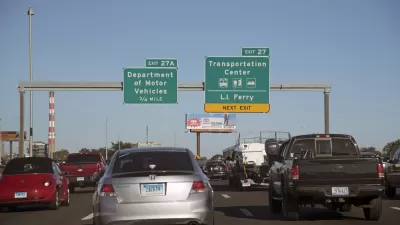Connecticut Governor Dan Malloy sees potential benefits in economic development and congestion reduction in a pair of highway widening proposals in his state.
Heather Brandon reports that Connecticut Governor Dan Malloy has hit the road to stump for a plan to add lanes to part of I-84 and the length of I-95 in the state.
A soundbite from Gov. Malloy quoted in full in the article claims a dramatic multiplier effect from the highway widening projects: "Adding travel lanes in both directions on I-95 from Greenwich to North Stonington, and on I-84 between the areas of Waterbury and Danbury, would provide economic benefits to our state of nearly 40 billion dollars -- about four times the cost of widening those two highways," Gov. Malloy said. Unmentioned are the likely effects of ongoing maintenance costs or long-term externalities like pollution on the size of that multiplier.
The article begins with an interesting take on induced demand (in this case defined as "a term economists use to describe how a bigger supply of a good thing can make people want more of it"), which says that Gov. Malloy is "banking" on induced demand rather than neglecting to consider the long-term effects of induced demand. Gov. Malloy himself implies the latter: his second talking point in favor of widening the highways is as a congestion reduction measure. Eventually, Brandon quotes Charles Marohn, founder of Strong Towns, to counter that argument, and explain the possible futility of the project as a congestion reduction measure.
In an earlier article, Joseph Cutrufo described a double standard afforded highway widening projects by the media.
FULL STORY: Gov. Malloy: Widening Highways Is Good for the State Economy

Alabama: Trump Terminates Settlements for Black Communities Harmed By Raw Sewage
Trump deemed the landmark civil rights agreement “illegal DEI and environmental justice policy.”

Study: Maui’s Plan to Convert Vacation Rentals to Long-Term Housing Could Cause Nearly $1 Billion Economic Loss
The plan would reduce visitor accommodation by 25% resulting in 1,900 jobs lost.

Planetizen Federal Action Tracker
A weekly monitor of how Trump’s orders and actions are impacting planners and planning in America.

Waymo Gets Permission to Map SF’s Market Street
If allowed to operate on the traffic-restricted street, Waymo’s autonomous taxis would have a leg up over ride-hailing competitors — and counter the city’s efforts to grow bike and pedestrian on the thoroughfare.

Parklet Symposium Highlights the Success of Shared Spaces
Parklets got a boost during the Covid-19 pandemic, when the concept was translated to outdoor dining programs that offered restaurants a lifeline during the shutdown.

Federal Homelessness Agency Places Entire Staff on Leave
The U.S. Interagency Council on Homelessness is the only federal agency dedicated to preventing and ending homelessness.
Urban Design for Planners 1: Software Tools
This six-course series explores essential urban design concepts using open source software and equips planners with the tools they need to participate fully in the urban design process.
Planning for Universal Design
Learn the tools for implementing Universal Design in planning regulations.
Caltrans
Smith Gee Studio
Institute for Housing and Urban Development Studies (IHS)
City of Grandview
Harvard GSD Executive Education
Toledo-Lucas County Plan Commissions
Salt Lake City
NYU Wagner Graduate School of Public Service



























